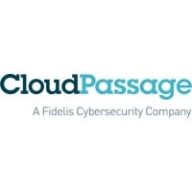


CloudPassage and Microsoft Defender for Cloud are products in the cybersecurity category, with Microsoft Defender for Cloud having an edge due to its comprehensive features.
Features: CloudPassage offers lightweight agent deployment, rapid scalability, and automated security controls. Microsoft Defender for Cloud provides advanced threat detection, security posture views, and integration with Microsoft services.
Ease of Deployment and Customer Service: CloudPassage is known for a quick deployment process and strong support. Microsoft Defender for Cloud uses existing infrastructure for integration and has extensive support resources.
Pricing and ROI: CloudPassage has a lower initial cost with flexible licensing for quick ROI. Microsoft Defender for Cloud has higher upfront pricing, justified by its extensive features and integration benefits.


SentinelOne Singularity Cloud Security protects cloud workloads, offering advanced threat detection and automated response. It integrates seamlessly with cloud environments and secures containerized applications and virtual machines against vulnerabilities.
SentinelOne Singularity Cloud Security is renowned for its efficiency in mitigating threats in real-time. The platform integrates effortlessly with existing cloud environments, ensuring robust cloud security management with minimal manual intervention. Securing containerized applications and virtual machines, it excels in threat intelligence and endpoint protection. However, improvements are needed in performance during high workload periods, and more integrations with third-party tools and better documentation would be beneficial. Users often find the installation process complex, support response times slow, and the dashboard's navigation unintuitive.
What are the key features of SentinelOne Singularity Cloud Security?In specific industries, SentinelOne Singularity Cloud Security is implemented to safeguard critical data and infrastructure. Organizations in finance, healthcare, and technology depend on its real-time threat detection and automated response to protect sensitive information. Its ability to secure containerized applications and virtual machines is particularly valuable in dynamic environments where rapid scaling is necessary.
CloudPassage Halo is an agile security and compliance platform that works in any cloud infrastructure: public, private or hybrid. The platform is unique because it provides continuous visibility and enforcement delivered as a service, so it’s on-demand, fast to deploy, fully automated and works at any scale.
The CloudPassage platform delivers a comprehensive set of security and compliance features, so you don’t have pay for and manage point solutions that often don’t integrate well with each other. Hundreds of companies use CloudPassage as a strategy to take full advantage of the business benefits of their cloud investments, with the confidence that critical business assets are protected. Using CloudPassage, security organizations achieve 6 critical control objectives with a platform that is flexible, fast and scalable:
Visibility: Immediate, consistent, continuous knowledge of what assets exist, where they reside, and what they’re doing.
Strong Access Control: Strong, layered controls enabling authorized access & denial of resources to unauthorized entities.
Vulnerability Management: Continuous detection & elimination of issues that create exploitable points of weakness.
Data Protection: Assurance that critical data is encrypted & used appropriately by authorized entities while in motion or at rest.
Compromise Management: Capabilities that enable detection & response to malicious or accidental compromise of resources.
Operational Automation: Day-to-day management of technologies & processes that ensure security & compliance.
Microsoft Defender for Cloud is a comprehensive security solution that provides advanced threat protection for cloud workloads. It offers real-time visibility into the security posture of cloud environments, enabling organizations to quickly identify and respond to potential threats. With its advanced machine learning capabilities, Microsoft Defender for Cloud can detect and block sophisticated attacks, including zero-day exploits and fileless malware.
The solution also provides automated remediation capabilities, allowing security teams to quickly and easily respond to security incidents. With Microsoft Defender for Cloud, organizations can ensure the security and compliance of their cloud workloads, while reducing the burden on their security teams.
We monitor all Cloud Workload Protection Platforms (CWPP) reviews to prevent fraudulent reviews and keep review quality high. We do not post reviews by company employees or direct competitors. We validate each review for authenticity via cross-reference with LinkedIn, and personal follow-up with the reviewer when necessary.